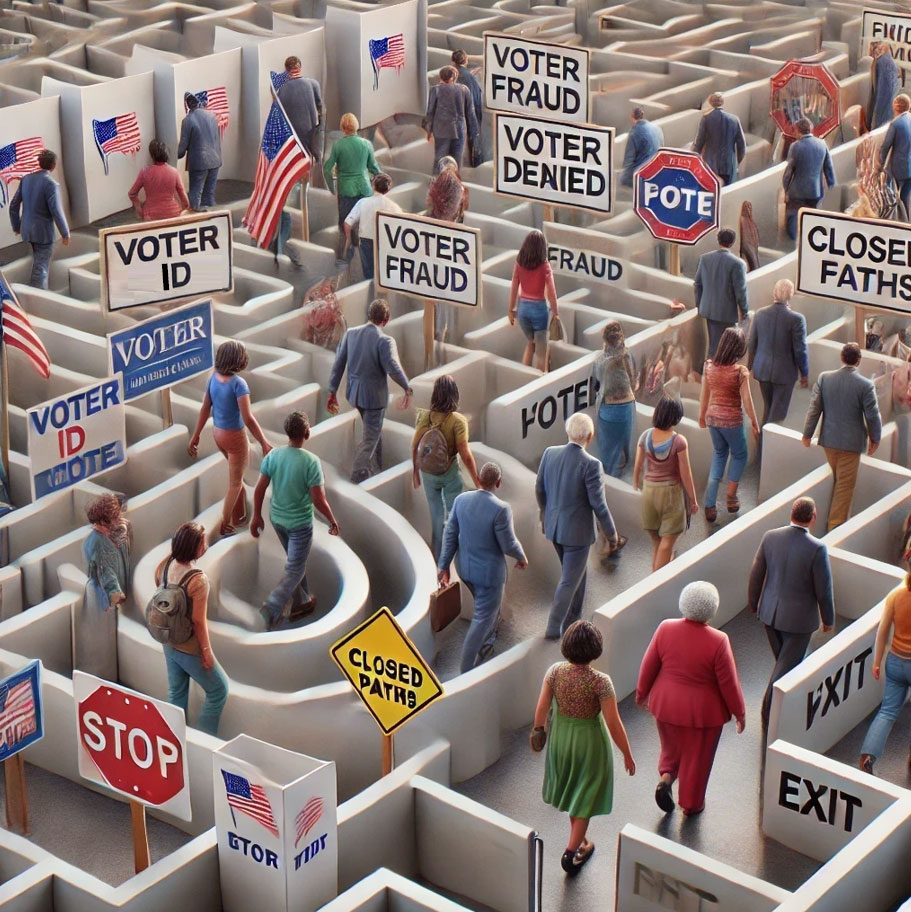Why the Next Election is the Most Important in US History
Our First Editorial
Hello and Welcome to SOS Democracy in Danger
You may be wondering why we started this democracy news website? Some will say it is just another anti Trump, anti MAGA mouthpiece. And we accept it may look like that because of the timing of our launch. But timing is crucial; it can mean the difference between helping to shape the conversation or being left out of it. With the right timing, you’re in the game; without it, you’re just a spectator.
We feel Democracy and Democratic Ideals are being slowly eroded not just in America but in many democratic countries. Sometimes it is an outright attack but often it is covert and generally people don’t realize what they are putting at risk, or worse, what they could easily lose, almost by accident.
Democracy is on a slippery slope
We must speak out now, before the next presidential election, because our concern is democracy is on a slippery slope in America. The next presidential election is not just about who will be President for the next 4 years, it is a vote for, a choice, to continue to evolve as a democracy or to change lanes and head towards authoritarianism.
This election is doubly important because of America’s role as the leader of the democratic world. If America changes direction, that will put democracy around the world in danger.
History is littered with examples of how nations slid into authoritarianism, some recovered like Germany, Italy and Japan after World War two, but many have not.
It is understandable that when things are not going well, a strong man looks like a solution. But what people don’t see or don’t want to see, is what they lose under such a system. The first thing is freedom. You may think if you don’t like the way things turn out, you can just vote them out. But strong men don’t let go of power so easily. Ask the Russians, ask the Iranians, the North Koreans and the Chinese if they can vote out their strong men?
This paradox highlights the fact that while democracy is imperfect, it remains the best system we have for ensuring individual liberties and fair governance. Today, however, emerging threats challenge the very fabric of our democratic institutions, and it’s imperative that we recognize and address them before it’s too late.
We are not professional Journalists
My friends and I are not political commentators and it’s not something we ever imagined we would do. Our major contribution to democracy has been to vote.
One of the things we enjoy is debating, which sometimes leads to heated discussions on politics, religion, philosophy, history, society and even recipes. You’d be surprised how heated a discussion over a recipe can be.
But the one thing we agree on is, democracy is in danger and is on a downward slide, not just in America but around the world.
Democracy is an ideal, a concept, a way of life. No one can force a country to be democratic because that wouldn’t be democratic. It would be like building a house on quicksand, it wouldn’t survive the first earthquake.
Which makes us wonder, what is our democracy built on?

The Inherent Value of Democracy
At its core, democracy is built upon principles that empower individuals and protect their rights.
- Free and fair elections ensure that government officials are accountable to the people
- The rule of law guarantees that everyone is subject to the same laws, preventing abuses of power.
- Protection of individual rights safeguards freedoms such as freedom of speech, assembly, and religion, allowing a diverse society to flourish.
These principles were not established overnight. Throughout history, countless individuals have fought, and even sacrificed their lives, to achieve and maintain democratic systems.
In America, from the American Revolution to the civil rights movement, the journey toward a more inclusive and representative democracy has been arduous. Each struggle has reinforced the importance of vigilance in protecting the rights and freedoms we hold dear.
Emerging Threats to Democratic Institutions
Despite the progress made, several developments raise concerns about the future of our democracy. These threats, if left unchecked, could undermine the institutions that have long safeguarded our freedoms
Concerns Over Project 2025
Project 2025: is a strategic plan prepared by The Heritage Foundation, but many of its authors served in the first Trump administration and are likely candidates for a second one, if he is elected again. It aims to fundamentally reshape the federal government. While the authors and their supporters argue it’s designed to streamline government functions, many worry that it could concentrate power in ways that resemble authoritarian regimes. Some examples include:

Weaponization of Justice: One of the most alarming aspects is the potential for the justice system to be used against political opponents. If the mechanisms of justice become tools for silencing dissent, it undermines the rule of law and erodes public trust in legal institutions. Such a shift could lead to a climate of fear, where individuals are hesitant to express opposing views. That will stifle open discussion which is so essential for a healthy democracy. Like this article for instance and this website.
2. Replacing Impartial Civil Servants with Loyalists
The Role of Civil Servants: A competent, neutral bureaucracy is the backbone of any functioning democracy. Civil servants are expected to implement policies and provide services impartially, regardless of which political party is in power. Their expertise and continuity ensure that government operations remain stable and effective.
Potential Consequences of Schedule F, Agenda 47 and Project 2025: Proposals to replace long-standing civil servants with individuals who pledge personal loyalty to a particular leader threaten this neutrality. Such actions could lead to a bureaucracy filled with sycophants rather than experts, compromising the quality of governance. Decisions could, and probably would, be made based on political considerations rather than the public interest, leading to inefficiencies and a loss of public trust.

Editor's Note
Schedule F was an executive order issued by President Trump in October 2020, shortly before he left office.
The official title of the executive order was “Executive Order 13957: Creating Schedule F In The Excepted Service.” This order would have created a new category of federal employees called “Schedule F” for positions of a confidential, policy-determining, policy-making, or policy-advocating character.
The order would have made it easier to hire and fire employees in these positions, potentially affecting tens of thousands of career civil servants by reclassifying them into this new category. This would have effectively stripped them of many civil service protections.
However, it’s important to note that this executive order was revoked by President Biden in January 2021, shortly after he took office. As of now, Schedule F is not in effect but Donald Trump has pledged to reinstate it and this is supported by the Heritage Foundation in Project 2025, a playbook for the first 180 days of the new Administration.
Environmental Protection Agency (EPA):
- Expertise Matters: The EPA plays a crucial role in safeguarding our environment. Its staff includes scientists and specialists who understand the complexities of environmental protection. Their work ensures that policies are grounded in science and aimed at preserving natural resources for future generations.
- Risk of Politicization: If the EPA becomes a tool for political agendas, ignoring scientific evidence, it could lead to environmental degradation. Policies might favor short-term economic gains over long-term sustainability, harming ecosystems and public health.
Securities and Exchange Commission (SEC):
- Market Integrity: The SEC is responsible for regulating the financial markets, ensuring transparency, and protecting investors. Its impartial oversight is vital for maintaining confidence in the economic system.
- Impartial Regulation: Concerns arise when the SEC’s neutrality is threatened. If regulations are adjusted to favor certain businesses or political interests, it would lead to unfair practices and economic instability. Such a shift undermines the principles of a free market and can have widespread negative effects on the economy.
Erosion of Individual Rights
Individual rights are the cornerstone of democracy, allowing citizens to make personal choices without undue government interference. Recent developments suggest that some of these rights are at risk.
- Women’s Reproductive Rights
- Recent Developments: There has been a significant rollback of abortion rights in several states, limiting women’s access to reproductive healthcare. These changes not only affect individual autonomy but also set a precedent for government overreach into personal decisions.
- Broader Impact: If authoritarian trends continue, other personal freedoms could be eroded. The restriction of one right often leads to the curtailment of others, affecting various aspects of daily life, from privacy to freedom of expression. See https://sosdemocracyindanger.com/gops-wake-up-call-for-women/
- Alarming Statements from Leaders
- Respecting Democratic Norms: Leaders have a responsibility to uphold the principles of democracy, including respecting electoral processes and encouraging peaceful transitions of power. When leaders question the legitimacy of elections without evidence or suggest that only certain outcomes are acceptable, it weakens public confidence in the system.
- Condemning Violence: Suggesting that unfavorable electoral outcomes could lead to unrest or violence is deeply concerning. Such rhetoric can incite division and potentially lead to actual conflicts, disrupting the societal harmony that democracy relies upon. See MAGA Ringleader Reveals Authoritarian Ambitions – SOS Democracy in Danger
- Supporting Democratic Processes: It’s essential to ensure that elections are conducted transparently and fairly. This includes safeguarding against interference, ensuring all eligible voters can participate, and respecting the outcomes. See: Elections Under Attack – SOS Democracy in Danger
- Rejecting Threats: Democracy cannot thrive in an environment of intimidation. Rejecting any form of coercion or threats related to electoral outcomes is crucial. Citizens should feel confident that their vote matters and that the process is free from undue influence.
- Civic Engagement: Active participation is vital. Voting is a fundamental right and responsibility, but engagement shouldn’t stop there. Advocacy, community involvement, and open dialogue contribute to a vibrant democracy.
- Vigilance: Staying informed about governmental actions and policies is crucial. By monitoring changes that could undermine democratic institutions, citizens can hold leaders accountable and push back against detrimental shifts.
The Danger of Authoritarian Rhetoric
The health of a democracy is closely tied to the tone set by its leaders. Rhetoric that undermines democratic norms can have far-reaching consequences.
The Importance of Free and Fair Elections
Elections are the mechanism through which the will of the people is expressed. Maintaining their integrity is non-negotiable for a functioning democracy.
The Path Forward
Addressing these challenges requires collective effort and commitment to democratic principles.
Conclusion
Democracy is not a static achievement but a continuous endeavor that requires our diligent protection. The freedoms and rights we enjoy today result from the hard work and sacrifices of those who came before us. Recognizing the fragility of democracy is the first step toward safeguarding it. We must not become complacent or assume that democratic erosion can’t happen here.
Call to Action
Now is the time to stand up for the democratic values that form the bedrock of our nation. By engaging in the political process, demanding accountability, and fostering open discourse, we can preserve our hard-won freedoms. Let us recommit to the principles of democracy, ensuring that it remains robust for future generations. The stakes are high, and the responsibility rests with each of us to keep the flame of democracy burning brightly.
No matter how you feel about the individual candidates, this election is not just about who will be President, it is about what type of system you want to live under. It is Democracy Vs Authoritarianism.
Editor
Ric Vatner